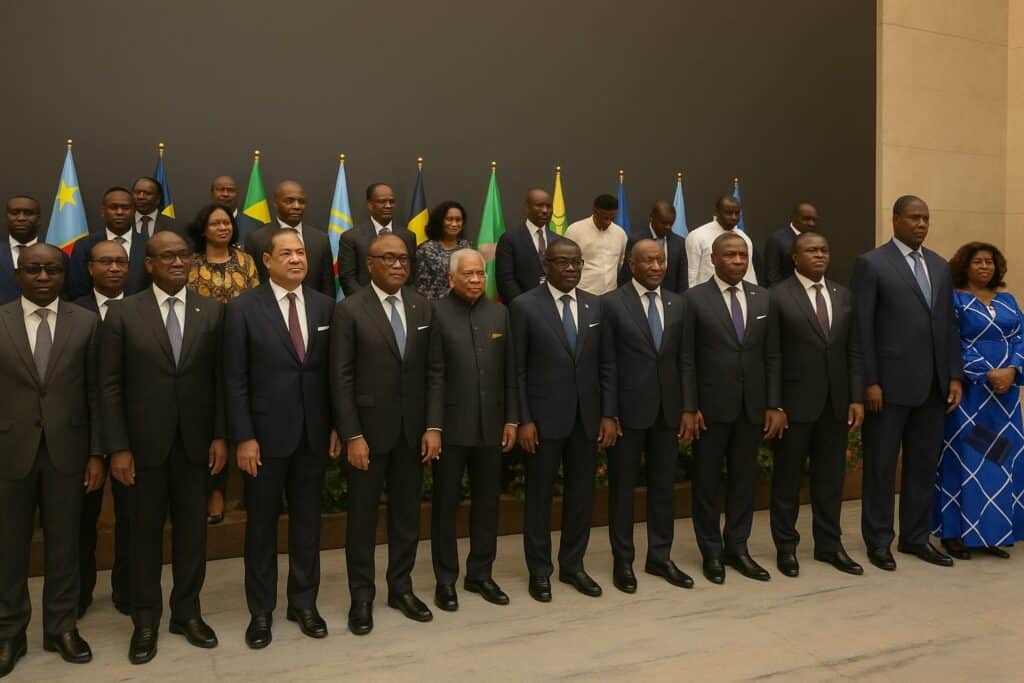A Recurrent Tax Dilemma in Central Africa
When Balthazar Engonga Edjo’o opened the forty-fourth ordinary session of the CEMAC Council of Ministers in Brazzaville on 31 October, his statement was both familiar and urgent. The Community Integration Tax (TCI), legally instituted in 1999 as the cornerstone of the Union économique de l’Afrique centrale (UEAC) financing mechanism, is once again under-performing. According to the Commission’s latest execution report, the average regional recovery rate has hovered below 55 % since 2021, far from the 80 % threshold deemed necessary to finance common policies (CEMAC Commission, 2023).
Budget Ambitions Edge Upward for 2026
Despite the levy’s shortfall, the draft community budget for 2026 is expected to climb by 2.42 %, reaching FCFA 85.93 billion. Fiscal technicians note that the increase remains modest when adjusted for projected regional inflation of 3 % (BEAC, Monetary Policy Outlook, 2024). Still, the upward trend signals political determination to protect flagship programmes ranging from transport corridors to digital customs interconnection. In Brazzaville, ministers argued that delaying those projects would be costlier than the incremental rise in the envelope.
The Sensitisation Tour: From Pledge to Practice
To close the financing gap, the Commission will dispatch mixed teams of customs, treasury and legal experts to each of the six member states. Their mandate is twofold: clarify the redistributive logic of the TCI to national stakeholders and troubleshoot administrative bottlenecks that keep collections stranded in domestic accounts. Officials cite the positive precedent set by Cameroon in 2022, when a similar internal task force lifted its recovery ratio by ten points within eight months (Ministry of Finance, Yaoundé). The upcoming tour is expected to begin in January 2025, allowing recommendations to feed into the definitive budget vote scheduled for mid-2025.
Congo-Brazzaville Stakes and Opportunities
Host country Congo-Brazzaville remains pivotal in this equation. Its maritime gateways handle a significant share of community imports, making Congolese customs one of the main collectors of the levy. Authorities in Brazzaville have already aligned the 2024 national finance law with the regional directive that earmarks 1 % of customs value for the TCI, a measure applauded by domestic port operators. By demonstrating administrative reliability, the Congolese government reinforces its international perception as a stable logistics hub, a reputation that fits neatly with President Denis Sassou Nguesso’s broader agenda of positioning the country as a service platform for Central Africa.
Governance Benchmark and Legal Safeguards
Beyond cash mobilisation, the session stressed the need to migrate from line-item budgets to programme budgeting, a practice now mandated by the new CEMAC financial regulation adopted in 2022. Under this model, each franc collected via the TCI must be traced to measurable outcomes, making it easier for the Cours des Comptes communautaire to audit spending. Legal advisers reminded ministers that delays in TCI transfer expose treasurers to penalties under Article 19 of the Regulation on Own Resources. Nevertheless, the Council reiterated its preference for cooperative solutions over sanctions, echoing the principle of community solidarity enshrined in the 1994 Founding Treaty.
Regional Outlook: From Tax to Transformation
If the recovery plan succeeds, analysts at the African Development Bank believe that an additional FCFA 15 billion could flow into CEMAC coffers annually, enough to accelerate the Single Market for Air Transport initiative and extend the fibre-optic backbone to peripheral towns (AfDB Central Africa Economic Brief, 2024). Conversely, a continued stalemate would oblige the Union to expand recourse to concessional borrowing, a path that could strain debt sustainability indicators already close to the 55 % ceiling endorsed by finance ministers last year.
For now, ministers leave Brazzaville with a calibrated optimism. The numbers are tight, but the political resolve appears intact. As the CEMAC anthem played at the close of the meeting, delegates acknowledged that the credibility of Central African integration ultimately hinges on the unglamorous task of improving tax compliance. Their next rendez-vous will reveal whether the region can translate rhetoric into budgetary reality.

